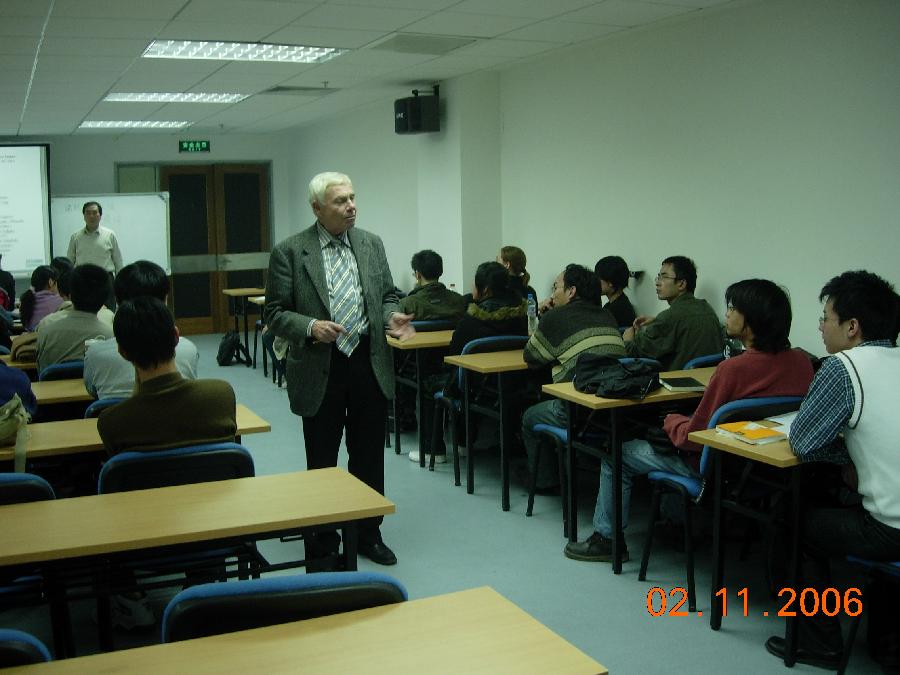10月26日至11月7日,德国著名思想史学者Gebhardt教授应北京大学欧洲研究中心邀请来我校进行为期一周的访问讲学。Gebhardt教授在北大的讲座分为“公共秩序和政治思想:以欧洲为例”和“帝国概念的反思”两个主题。

前一个主题涵盖了从希腊、经罗马及中世纪再到近代欧洲的宏大历史图卷,Gebhardt教授以政治思想与公共秩序构件的相互关系为线索将整个欧洲政治与社会的演变精彩地呈现在我们面前。

11月2日,Gebhardt教授作为北京大学政治哲学论坛邀请学者为北大学生做了题为“帝国概念反思”的演讲。“帝国”主题具有深刻的现实背景。2001年,美国国防部长拉姆斯菲尔德发起了一项关于古代帝国如何维持其统治的研究。这标示出美国政治舆论的一次重要转变——帝国的观念重新进入了研究者的视野。现有的研究大多从政治权力及其所依托之军事、经济、政治与意识形态资源的角度,重构与分析由帝国主导的世界秩序结构。Gebhardt教授对帝国概念的反思提醒人们不能忽略这一关键的隐含意义,即世界帝国的观念与普世主义紧密相连,他试图按照某种普遍的秩序观念,将人类组织在以想象力结构之下,而这一权力结构则囊括了人及所指的整个世界。

Gebhardt教授是德国著名的政治思想史学者,师从当代重要政治思想家Eric Voegelin(1901-1985),曾先后任教于德国慕尼黑大学、波鸿大学,担任过波鸿大学社会科学学院院长、德国政治学学会执行委员会委员,现为埃尔兰根大学政治学教授,埃尔兰根大学理事会、参事会成员。Gebhardt教授在政治思想史领域发表过数百种专题论著及论文,主题涵盖古希腊、古罗马、中世纪及现代西方政治思想,并对包括中国在内的众多非西方社会的政治思想传统有良好的理解。
Professor Gebhardt,a very famous Germany scholar on history of thought, was invited by Centers for European Studies at Peking University for academic communication from October 26th to November 7th. His lectures involves two themes, one of which is “Public Order and Political Thought: The case of Europe” and the other is “The Idea of Empire Reconsidered”.
The first theme included five sequential parts:
Ⅰ. Preliminary remarks
Ⅱ.The origins of ‘Politics’ in ancient Hellas: a paradigm gained Greek exceptionalism
Ⅲ.Rome: The aristocratic experiment
Ⅳ.The Christian evocation
Ⅴ.The unfolding of a new political and spiritual world
Professor Gebhardt gave us a serial of wonderful lectures to portray the political and social evolution of Europe from the perspective of public order and political thought.
On November 2nd professor Gebhardt made another speech concerning “the idea of empire reconsidered”, which was also the second lecture of the forum of political philosophy in PKU. The term of “empire” has a profound realistic background. In 2001 Defence Secretary Donald Rumsfeld initiated a study on ‘Ancient Empires’and how they maintained dominance. It signaled a change in the climate of opinion in the US: the idea of empire was back. The synchronic approach which argues that Imperial power feeds on military, economic, political and ideological resources- those are the recurring elements that according to the lead literature constitute imperial orders, however, misses the crucial point that there is a meaningful historical pattern of empire formation, and, further on, that the idea of word empire is an essential to empire building, and involves more than just being a power resource as is generally held. The vision of empire emerges from the series of the great post-axial-time civilizations that structure world history since 800 B.C. It is bound up with the universalisms that bring to the fore the novel conception of humankind that represents the ‘inhabited world’. The idea of World Empire is contingent on the idea of organizing human kind in terms of a power structure embracing the whole of the inhabited world according to a universal vision of order.
